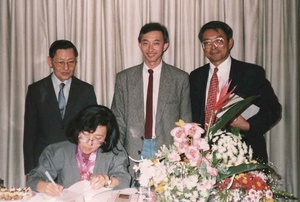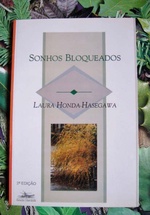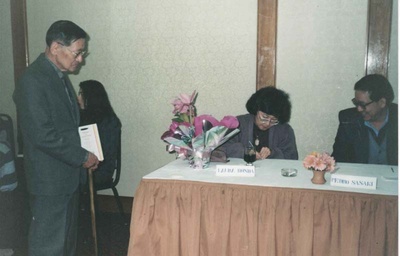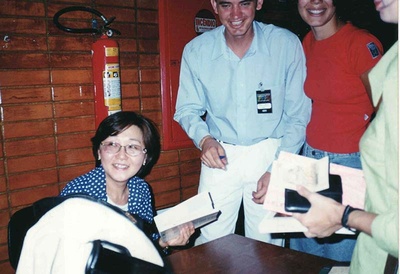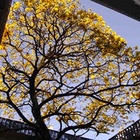I feel joy from within my heart through writing. Writing about things has given me a feeling of purpose in life, and thanks to that I’ve been able to enjoy my walk through the long journey of life thus far.
During my childhood, I would often scribble all over the bottom of drawers. I secretly wrote on the bottom side to keep it from being seen by anyone. I still remember—a long line of what looked like words and pictures, all over. It must have been such a wonderful story for young little me.
My father was the one who taught me the alphabet. Before entering elementary school, writing my name and a few other vocabulary words was my daily practice.
Once I became able to write sentences, I began to enjoy writing letters to my friends and my cousins in the countryside. I didn’t care if I received a response or not. I just kept writing. Even now, I send out letters and emails without expecting a response in return.
I began writing poetry in elementary school. My first poem was called “Where Am I Going”, but it wasn’t anything deeply meaningful. As I became a high school student, I explored more serious topics, and some were selected in contests.
I remember publishing my own, hand-made newspaper as well. The name of the paper was “A Small Drawer”. Working feverishly, I put together the news, editorials, advertisements, and even the comics, all on my own. Later on, when I became a teacher, I taught my students about newspaper making by using the same methods that I had once used. Among my students, there were some that went on to make their own newspapers, which turned out so nice that they were able to sell them to their friends and neighbors.
As I moved on to high school, I had become a ghostwriter for the girls in my class who asked me to write letters and poems for them. These were addressed to their boyfriends. As I look back, I’m amazed with embarrassment that I was able to write words “as sweet as honey” to these boys whom I didn’t even know.
My four years in college was a blank period. I had no time to write about anything aside from coursework reports and my thesis for my major.
While studying abroad in Japan, I wrote for the Brazilian Exchange Student Newspaper from time to time.
After returning to Brazil, I submitted several articles for Nikkei newspapers and magazines regarding the culture of Japan.
As a teacher of Portuguese and Brazilian literature for over 30 years, I created texts almost every day to use in my classes. I was also involved in writing screenplays for the school’s cultural festival, as well as with the school newspaper.
In 1991, my long-sought first book was published. It was titled Sonhos Bloqueados. Thankfully, it became very popular. Thanks to this short novel, I was able to visit many places and meet several people.
Later, there would be three of my creations out in the world—each book precious as if they were my own children. With each publication, I began to receive requests to “please write in Japanese, too!” from all over the place.
I had always thought I would like to write in Japanese one day, but I had neither the confidence nor the courage to do so. Everything changed after I took a trip to Japan in 2005.
I was miraculously reunited with a friend that I had met 33 years ago. In order to carry on a correspondence with my friend, I had no choice but to write in Japanese. As we continued to exchange letters I became more intrigued with the Japanese language. I began to enjoy writing in Japanese, and it eventually brought up the courage to write in Japanese. My adventures of writing in Japanese got its start because I began exchanging letters with an old friend. However, I can say that if I didn’t have access to Japanese conversion software, I imagine my Japanese would only have improved at a turtle’s pace.
The other day, another friend of mine gave me an interesting book in Japanese as a gift. It was a Japanese dictionary of onomatopoeic/mimetic words, and I’m absolutely hooked on it. With respect to the unique onomatopoeia of Japanese, I wrote the following poem:
First Date
Sunday—will the weather be good?
I hope it doesn’t rain hard zaa-zaa
Because it’s my first date…
Will it be romantic?
A gentle drizzle shito-shito
Glittering eyes kira-kira
Fluttering hearts doki-doki
The 2 of us, nervous odo-odo
Under 1 umbrellaSunday—will it be hot?
With the sun beating down kan-kan
Stinging sunburns hiri-hiri
Parched throats kara-kara
Aah, I would hate that
But wouldn’t it be fun?
Big, open skies hiro-biro
Cheerful walks uki-uki
The 2 of us, smiling niko-niko
Our first dateSunday is here
Excitement waku-waku, nervousness sowa-sowa
Anxiously waiting for the phone call ira-ira
Ring-ring!
On pins and needles hiya-hiya, picking up the phone
“Hello?
My soccer practice was
Soooo tough kitsu~i
I’m dead tired heto-heto. I’m sorry”
Heartbroken gakkuri, feeling down shonboriSunday afternoon
In front of the TV
My dog Pochi is sleeping soundly suya-suya
I’m grumbling to myself butsu-butsu
Out side the window
Lightning flashes pika, pika
Thunder rolls goro-goro
It’ s a summer storm
Just like my heart
Starting with those scribbles, the appreciation and joy that I gain from writing will continue to grow in the years to come.
© 2011 Laura Honda-Hasegawa


